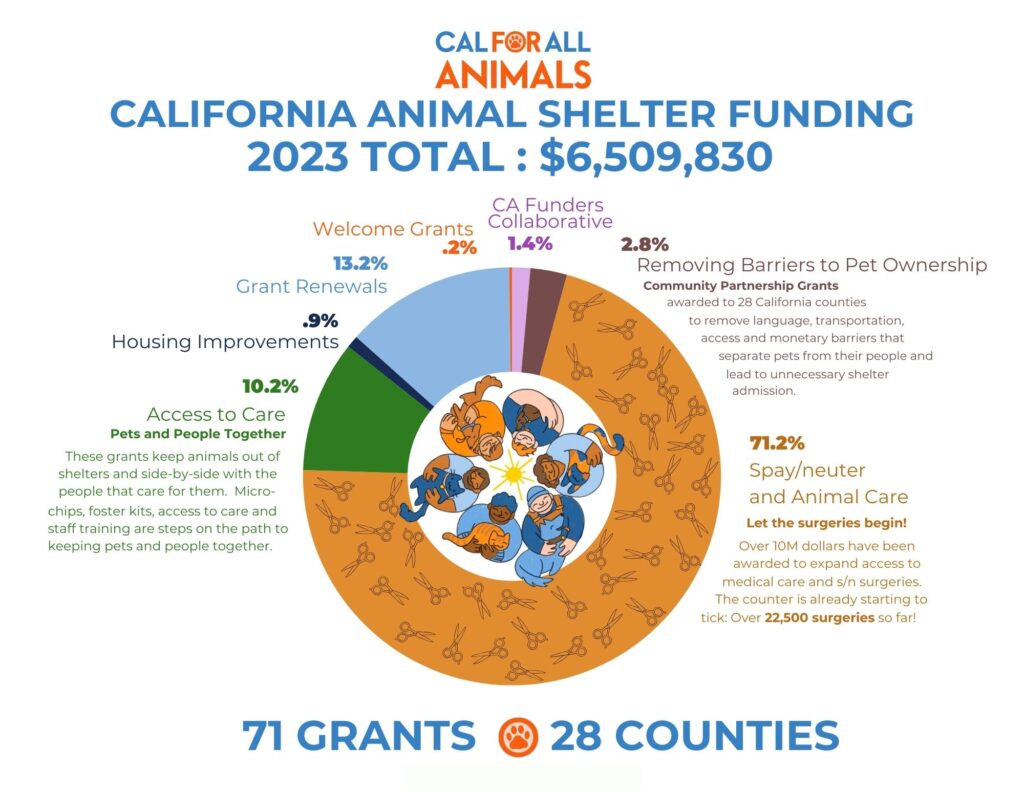In just over two years, the California for All Animals program has provided nearly $31.5 million in funding to animal shelters across the state. Funding has supported spay/neuter surgeries, veterinary care, supplies, equipment and staffing to keep pets and people together. The 2023 funding strategy was to provide support and partnership on grants awarded in 2022, continue to bridge the 3M spay/neuter surgery gap created during the Covid-19 pandemic, and continue to remove barriers and expand access to care.
Read below to learn more about how the 6.5M 2023 grant support was distributed to support California families and their well-being.

- Grant funding has been awarded for shelters to expand surgery capacity and partner with spay/neuter organizations such as CAMP LA, SNIP Bus, Valley Oak SPCA, and Animal Balance to provide low-cost or fully subsidized spay/neuter, vaccinations, and microchips to keep pets in their homes and prevent additional litters of puppies and kittens. Accessible spay/neuter promotes animal health, stabilizes community cat populations, and reduces the number of animals entering shelters. Over 4M dollars was awarded in 2023 expand access to spay and neuter.
- Grants made to animal control agencies and municipalities with animal control officers help keep pets in homes. Providing supplies like pet food, crates, fencing repair, and outdoor trolley systems keep pets with the families who already love and care for them. Supportive practices build relationships and address root issues that result in pet homelessness. For example, working with the community to help lost animals stay in their neighborhood improves the chances of that pet returning to their home by a factor greater than 10! Solution-focused programming allows animal control officers to move away from costly, punitive programming that breaks the bonds between pets and families and fills our shelters with pets who already have homes. Resources can be reallocated to focus on animals who do need intervention and enforcement, such as intentional cruelty, domestic violence cases and suspected dog fighting or cock fighting. Over $100,000 dollars have been awarded to support animal control agencies building proactive programs.
- Grants made to ensure essential pet services are accessible and inclusive for all Californians. Funding prioritizes bridging the gap between animal shelters and communities that have been disproportionately impacted by racial and economic inequities.Translating materials, hiring multilingual staff and collaborating with human service agencies and other community-based organizations ensures animal shelters can partner with all community members to keep the pets they love by their side.. Over $200,000 dollars have been provided to bridge the gap between California families and access to essential services and resources.
- Grants made to community support programs that keep pets with their people. When people are suffering, their pets are too. Animal shelters are partnering with human services agencies and community-based organizations to provide food and supplies, behavior and training services, vaccine clinics, veterinary care, and temporary crisis boarding to keep pets with the people who care for them. Programming and partnerships also provide crucial support and advocacy for Californians experiencing homelessness or domestic violence, with a focus on pet- and people-centered support that removes barriers to accessing safe and permanent housing. Over $500,000 dollars have been awarded to support California programs that keep pets in their homes.
- Grants made to foster programming keep vulnerable pets out of shelters. Engaging community members in the temporary care of kittens, puppies and any other pet who would benefit from a home environment allows pets to benefit from socialization and extra care. Shelters are providing the supplies and medical care needed to support foster caregivers preparing animals for adoption. Foster programs allow shelters to expand the care they give to animals in need, reduce the transmission of diseases, increase adoptability of all animals, and reserve space and resources for the most vulnerable animals, those who are injured, receiving extensive medical care or in need of secure housing due to behavioral or custody concerns. Over $500,000 thousand dollars have been awared to keep vulnerable pets out of the shelter.
- Grants made to support the care of animals in the shelter improve the well-being of both animals and staff. When animals do need homes, funding provides for the physical, medical and mental well-being of animals who are in the shelter’s care. This includes veterinary care supplies and services, behavior and enrichment, volunteer programs, equipment and supplies, and housing improvements. Every single shelter in California has been invited to upgrade to double-compartment housing which reduces the spread of disease and improves staff safety. See the housing map here: https://www.californiaforallanimals.com/grants/portal-grants/ Over $300,000 dollars have been awarded to support the care of animals housed in California shelters.

